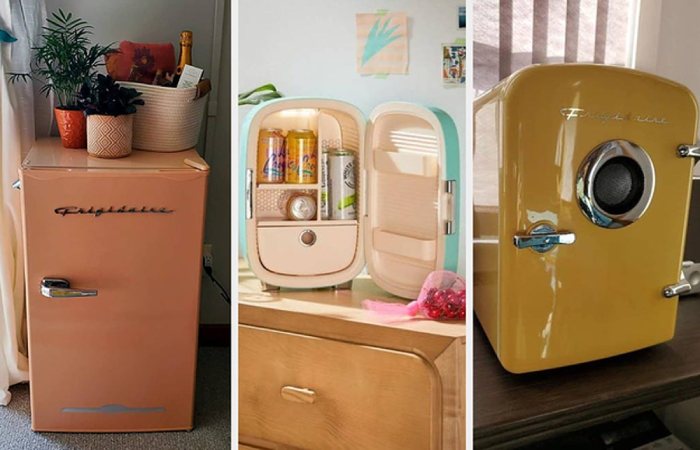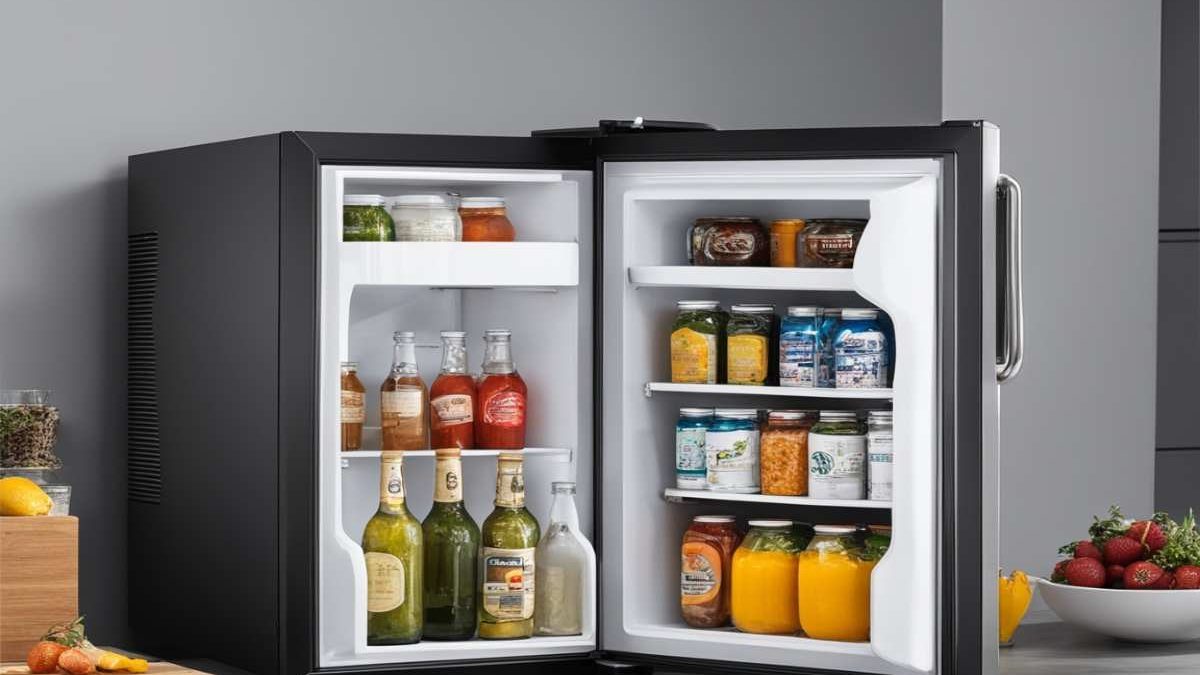Table of Contents
Introduction to Mini Fridges
Shop Mini Fridges on Sale a mini fridge is a compact and appropriate appliance that can serve various purposes, from keeping beverages cold in a dorm room to storing snacks in an office. With the right mini fridge, you can enjoy the benefits of refrigeration without the bulk and expense of a full-sized unit. This guide will help you navigate the world of mini-fridges, providing insights into the best options available on sale and what to consider when purchasing.
Mini fridges are smaller, more portable versions of traditional refrigerators. Whether you’re a student living in a dorm, an office worker looking to keep lunch fresh, or someone who needs extra cooling space at home, a mini fridge can be a practical and affordable solution.
Understanding the Types of Mini Fridges

Before diving into specific models, it’s essential to understand the different types of mini fridges:
Cube Mini Fridges: These are the smallest and most portable options, typically ranging from 1.6 to 2.6 cubic feet. They are ideal for dorm rooms, small offices, and personal spaces.
Tall Mini Fridges: These units range from 4.6 to 6.0 cubic feet and provide ample storage space, making them ideal for larger apartments, offices, or as a secondary fridge in a home.
Key Factors to Consider
While shopping for a mini fridge on sale, several key factors should influence your decision:
Capacity: Determine how much storage space you need. Mini fridges range from 1.6 to 6.0 cubic feet.
Energy Efficiency: Look for models with good energy efficiency ratings to save on electricity costs.
Temperature Control: Ensure the fridge has adjustable infection sceneries to keep your items at the optimal temperature.
Noise Level: Consider the noise level, especially if you plan to use the fridge in a bedroom or quiet office.
Portability: If you need to move the fridge frequently, consider its size, weight, and ease of transport.
Types of Mini Fridges on Sale
Various mini-fridges are on sale, each with its features and benefits. Let’s explore some common types:
- Thermoelectric Mini Fridges:These fridges use a thermoelectric cooling system, so they don’t use a compressor. It makes them quieter and more energy-efficient, but they generally don’t get as cold as compressor-based models. Perfect for drinks and snacks that don’t require freezing temperatures.
- Compressor Mini Fridges:These mini fridges use a compressor to cool, resulting in significantly lower temperatures. They’re ideal for storing various items, including perishable foods.
- Portable Mini Fridges:These mini fridges are designed for easy portability, often with handles and lightweight construction. Great for tailgating, camping, or simply moving between rooms.
- Mini Fridges with Freezers:Some mini fridges come with small freezer compartments, perfect for storing ice cubes or frozen treats.
Special Considerations
Noise Level
If you plan to use the mini fridge in a bedroom, dorm room, or quiet office, the noise level is crucial. Look for silent-operated models, typically indicated by a low decibel rating. Some mini fridges are designed with noise-reducing features, such as advanced compressors and sound-dampening materials.
Warranty and Support
A good warranty and reliable customer support can provide peace of mind. Look for mini fridges that offer extended warranties and responsive customer support to ensure you’re covered in case of any issues.
How to Choose the Right Mini Fridge
Choosing the right mini fridge depends on your specific needs and budget. Here are some steps to help you make the best decision:
Determine Your Storage Needs: Assess how much space you need to store your items and choose a mini fridge with sufficient capacity.
Consider Energy Efficiency: Look for models with good energy proficiency ratings to save on electricity costs.
Check Noise Level: Consider the noise level, especially if you plan to use the fridge in a quiet environment.
Assess Portability: If you need to move the fridge frequently, choose a model with good portability features.
Look for Additional Features: Consider features like adjustable shelves, freezer compartments, and door bins for convenience.
Read Reviews and Ratings: Look for user reviews and ratings to understand the fridge’s reliability and performance.
Where to Buy Mini Fridges on Sale
Consider the following retailers shopping for mini fridges on sale
Amazon: Amazon offers mini fridges from various brands, often at competitive prices and with frequent sales.
Walmart: Provides a variety of mini fridges at affordable prices, with regular sales and promotions.
Home Depot: Offers a selection of mini fridges from trusted brands, with occasional sales and discounts.
FAQ: Frequently Asked Questions About Mini Fridges
Q: How much energy does a mini fridge use?
A: A mini fridge’s energy feeding varies depending on the model, size, and features. However, most mini-fridges are designed to be energy-efficient, using significantly less electricity than a full-size refrigerator. Check the Energy Star rating for an indication of its energy efficiency.
Q: How long do mini fridges last?
A: A mini fridge can last for many years with proper care and maintenance. The lifetime can vary depending on the brand, model, and usage. However, expect a good quality mini fridge to last at least 5-7 years, sometimes even longer.
Q: How often should I clean my mini fridge?
A: It’s a good idea to clean your mini fridge at least once a month. Regular cleaning helps prevent the collection of bacteria and odors. Unplug the refrigerator, remove all items, and wipe the interior with a mild soap and water solution.
Q: What size mini fridge do I need?
A: The size of the mini fridge you need will depend on your needs and the available space. Consider how much you plan to store and measure the space where you’ll place the refrigerator before purchasing. Cubic feet are the key measurement to look at.
Q: Can I store perishable food in a mini fridge?
A: Yes, but it depends on the type of mini fridge and the temperature settings. Compressor mini-fridges are better suited for storing perishable food than thermoelectric models because they reach lower temperatures. Always check the temperature regularly to ensure your food remains safe.
Conclusion
Choosing the best mini fridge on sale involves considering factors like capacity, energy efficiency, temperature control, noise level, portability, and additional features. Whether you opt for a compact and efficient model like the Midea WHS-65LB1, a value-oriented option like the Black+Decker BCRK17W, or a stylish beverage cooler like the hOmeLabs Beverage Refrigerator and Cooler, there’s a mini fridge to suit every need. Whether you’re a student in a dorm, an office worker, or someone looking for extra cooling space at home, the right mini fridge can make all the difference.

